Heroic Manifestations of Ashura
Abstract
Imam Husayn’s refusal to accept the tyrant Yazid’s allegiance triggered the Battle of Karbala on the Day of Ashura. Imam Husayn, grandson of Prophet Muhammad, along with his family members and companions, were martyred on the plains of Karbala, and this marks a turning point for Shi’a Muslims.
Year after year, millions of people worldwide commemorate this tragedy to express their sorrow and  remind themselves to firmly stand against oppression as Imam Husayn did. This article focuses on the Imam’s bravery and steadfastness as seen in his encounters with the enemy, his sermons to all people, and on the battlefield.
remind themselves to firmly stand against oppression as Imam Husayn did. This article focuses on the Imam’s bravery and steadfastness as seen in his encounters with the enemy, his sermons to all people, and on the battlefield.
The heroic struggle of Imam Husayn

The great event of Ashura is replete with steadfastness and heroism of Imam Husayn and his companions. Therefore, this aspect of that great event has been more impressive than its other aspects, and it has a particular significance. Most people look at Karbala from this perspective and identify it with this characteristic. The steadfastness and gallantries were demonstrated by both Imam Husayn and his companions.
Regarding the bravery of Imam Husayn, it suffices to mention his sayings from his journey to Medina until his martyrdom.
His encounter with the governor of Medina
After Mu’awiyah’s death, Walid ibn ‘Utabah ibn Abi Sufyan, the governor of Medina, called Imam Husayn to the Medina headquarters and ordered Imam Husayn to swear allegiance to Yazid. In this meeting, which was the beginning of the Imam’s uprising initiated before the public announcement of Mu’awiyah’s death, Imam Husayn spoke about his own virtues versus Yazid’s immoralities, and said, A person like me would not swear allegiance to a person like him.2Also, in some versions of this quotation, the Imam added, I heard the Prophet say ‘Caliphate is forbidden to Abu Sufyan’s descendants.’ Then how shall I ever give allegiance to him3
His encounter with Marwan ibn Hakam
After the meeting, the next day Marwan advised the Imam to give allegiance to Yazid, to which Imam Husayn firmly responded, The Islamic nation must resign itself to the loss of Islam if it finds a ruler like Yazid. In other words, Islam will vanish with the rulership of Yazid. Imam said
.O’ Marwan! How do you urge me to give allegiance to Yazid, a wrongdoer Indeed, what you say is nonsense and I do not reprimand you for it, because you are the cursed person whom the Prophet cursed while you were not born yet. And it is improbable that the one who is cursed by the Prophet invites people to give allegiance to Yazid.4
The Imam’s firm resolution shocked Marwan and silenced him. No one but Imam Husayn dared to speak in this manner to Marwan5, and Marwan feared this could destroy his own reputation.
His reply to Muhammad Hanafiyyah
When Muhammad Hanafiyyah talked to the Imam about giving allegiance, Imam Husayn said, O’ my brother! By Allah, even if I find no refuge in the whole world, I would never give allegiance to the son of Mu’awiyyah.6
Imam Khomeini was a student and follower of the school of Ahlul Bayt. After being expelled from Iraq by its government and forbidden from entering Kuwait, Imam Khomeini said, I do not head for a specific place. The real important issues are carrying out divine duties and defending Islam and Muslims.7 Imam Khomeini also said, I will express my opinions, no matter where I go. I would go from one airport to another and from one city to another to tell the world that all the oppressors of the world have conspired with each other ignore to the voices of the oppressed throughout the world.8
Part of his sermon in Mecca
Death is predestined for human beings; it is hung around his neck similar to a necklace worn by a girl. I am as eager to meet my forefathers as Jacob was to meet Joseph.9
His encounter with Hurr
Hurr had threatened to engage in a war with the Imam, whom displayed his disapproval and said, Do you threaten me with death Can you do anything other than killing me10
In the Shaquq station
In this stop, a Kufan informed the Imam Husayn of the corruptions caused there. Imam Husayn responded by reciting a poem. One of its verses was, If the body is made for dying, it is better to be killed by the sword in the way of Allah.11
In the Bayzah station
The Imam quoted the Prophet If somebody witnesses a tyrannical king who practices forbidden (haram) acts as if they are permissible (halal), breaks the Divine promise, opposes the Prophet’s way of life (Sunnah), and oppresses people while saying and doing nothing to stand against the tyrannical ruler, Allah will place him in the abode of that oppressor.12 Then the Prophet enumerated the crimes of the Umayyads.
The above saying was used in either Imam Husayn’s letter or speech. It not only demonstrates his irreconcilability with the enemy and strong determination but also indicates that he would make any effort to demonstrate this heroic spirit to the society.
In Karbala
After arriving in Karbala, Imam Husayn gave his companions a speech, saying
.Under such circumstances, a faithful person should be willing to make any sacrifice to see his Lord. In such a situation as mine, I would consider death nothing but salvation and living with oppressors nothing but humiliation and ignominy.13
On the day of ‘Ashura and his refusal to give allegiance
The statements made by Imam Husayn on the Day of Ashura when he was again advised to give allegiance to Yazid later became mottos of the Shi’a community
By God I swear, I will neither extend my hand to offer a handshake for humiliating allegiance, nor will I escape like slaves.
Dying with honour is better than living with shame.
Dying is better than riding the horse of shame; and accepting shame is better than entering Hellfire and facing the wrath of Allah.14
Thus, giving allegiance to Yazid is not only a disgrace in this world, but it also means entering the Hellfire in the Hereafter which is incomparable with humiliation in this world.
Know that this evil-doer who is a son of an evil-doer makes me choose between two things the sword (to fight) and humiliating allegiance. We will never be humiliated! Neither God, His Prophet, the immaculate women who raised us, nor the zealous and dignified ones would let us accept such humiliation.
They would not permit us to prefer obeying immoral people over dying with honour. I have made all excuses invalid by these final notices. Know that I will fight with the help of my small family, but I do not accept to give this degrading allegiance, even if those who promised to help me have abandoned me.15
Notes
1. Hamase wa ‘Irfan (Heroism and Mysticism), pp. 261-269.
2. Bihar al-Anwar, vol. 44, p. 325.
3. Ibid., p. 325. It is also noteworthy that when the Walid ibn ‘Utabah (that is, Muawiyyah’s nephew) was the governor of Medina, there was a dispute between him and the Imam over a garden. Imam Hussain grabbed his turban and wrapped it around his neck. Walid did not dare to say anything. Marwan was a witness to the scene and said By Allah, I have not seen a person who dared to engage in dispute with the governor. Walid (who felt humiliated) said You did not say this sympathetically and in order to help me, but for your envy of me and my restraint before Hussain. The truth is that the garden belongs to Hussain (and he did so rightfully). Saying so, Walid wanted to make up for his lost reputation. Hearing that, Imam Hussain said Keep the garden. He said this and left. (Bihar al-Anwar, vol. 44, p. 191).
A similar event happened to Marwan. Out of his rancor to the household of the Prophet, once he told Imam Hussain, If you do not take pride in your mother, Fatimah, how will you be superior to us In response, Imam Hussain grabbed his neck and pressed it- usually when he grabbed something; he did so firmly and did not release his grip on it. He wrapped Marwan’s turban around his neck so strongly that he fainted.
Finally, Imam Hussain released his grip on him and told the Qurayshites there, By Allah, I want you to confirm me if I tell the truth. Is there anybody on the earth more beloved than my brother and I by the Prophet Muhammad Except my brother and I, do you know anybody to be the sons of the Prophte’s daughter They responded, No. Then he added, I do not know any cursed one, son of the cursed one except Marwan whose father was exiled on orders of the Prophet. By Allah, there is nobody found in the whole world who claims to be a Muslim and at the same time is more hostile than this man and his father to Allah, the Prophet and his household, (Bihar al-Anwar, vol. 44, p.206).
4. Maqtal Kharazmi, vol. 1, p. 185.
5. Marwan was son of Hakam son of Abi al-‘As, son of Umayyah. (So, Hakam, Marwan’s father was Mu’awiyah’s cousin and ‘Uthman’s uncle; since, Abi al-‘As was the brother of ‘Affan, father of ‘Uthman.) When the Prophet (S) conquered Mecca, Hakam had to convert to Islam together with Abu Sufyan and other polytheists in order to save his life. Once, the Prophet (S) came across Hakam (Marwan’s father) and stated Woe to my Ummah dealing with the child of this man. (i.e. Marwan).
The Prophet (S) exiled Hakam to Ta’if and even once wanted to take his eye out since he eavesdropped on private conversations of the Prophet’s (S) house and spread them in meetings and gatherings. (Of course, other reasons are also mentioned for his exile.) Once ‘Ayesha told Marwan I testify that the Prophet (S) cursed your father when you were in his [your father’s] loins! In his Usd al-Ghabah, Ibn Athir says No doubt despite the Prophet’s mercy and forgiveness, he cursed and exiled Hakam to Ta’if. This shows that he had not done little wrong! Hakam stayed with his son (Marwan) in Ta’if during the rest of the Prophet’s (S) life and ruling of the first and second caliphs but his nephew, ‘Uthman – during his government – asked him to come back.
Once, Imam ‘Ali saw Marwan and said Woe to you, woe to the Prophet’s Ummah dealing with you and your children. When Muslims attacked ‘Uthman’s house and killed him, Marwan’s neck was hurt and remained askew until the end of his life. Mu’awiyah appointed him as his agent in Medina and Mecca and later Ta’if, and dismissed him in 48 AH. After withdrawal of Mu’awiyah ibn Yazid (second Mu’awiyah) from rulership, Marwan became the caliph of Sham and finally was killed by his wives. (Cf. Usd al-Ghabah, vol. 2, p. 48, no. 1217, trans. by Hakam ibn Abi al-‘As Umaw!; Ibid. vol. 5, p. 139, no. 4848, trans. by Marwan ibn Hakam; Sharh Nahj al-Balaghah, Ibn Abi al-Hadid, vol. 6, p. 275, Sermon no. 72.)
Imam Hasan and Imam Husayn interceded and Marwan was released after he had been captured in the battle of Jamal. After his release, the two Imams reported to their father Marwan wants to swear allegiance to you. Imam ‘Ali stated Did he not swear allegiance to me after the murder of ‘Uthman in Medina Now I do not need his allegiance, because he is cooperating with deceitful Jews. If he swears allegiance to me with his hand, he would violate it very soon. Well, he will rule so long as a dog licks his nose [for a very short time]. He is the father of four rams (who will also rule). The people will face hard days due to him and his sons. (Nahj al-Balaghah, Sermon no. 73)
6. Bihar al-Anwar, vol. 44, p. 329.
7. Sahifeh-ye Nur, vol. 1, p. 587 (The message of Imam Khomeini to the Iranian Nation; 1061978).
8. Kawthar, vol. 1, p. 438. Cf. speech made by the departed Hujjat al-Islam Sayyid Ahmad Khomeini.
9. Bihar al-Anwar, vol. 44, p. 366.
10. Irshad, vol. 2, p. 81. Hussain (A) is the son of Ali ibn Abi Talib (A), who said the same when he had been arguing with Ash’ath ibn Qays (May Allah curse him). When Ash’ath threatened to kill. Imam ‘Ali, he (A) said, Do you threaten me with death! By God I swear that I do not fear that I go toward death voluntarily or it approaches me suddenly, (Bihar al-Anwar, vol. 42, p. 233.)
An argument broke out between Bar!r and Shimr on the eve of Ashura, and Shimr threatened Barir with death. Barir said Do you threaten to kill me ! By God I swear that dying with the Prophet’s grandson (A) is much more preferable for me than living with you! By God I swear that the Prophet (S) will not intercede on behalf of people who kill his Household. (Maqtal Kharazmi, vol. 1, p. 251.)
11. Ibid. p. 223.
12. Ibid. p. 234.
13. Bihar al-Anwar, vol. 44, p. 381.
14. Ibid. pp. 191 & 192.
15. Tuhaf al-‘Uqul, p. 241; Maqtal Kharazmi, vol. 2, p. 7 (with a little difference)
Source: www.alhassanain.org
این مطلب بدون برچسب می باشد.



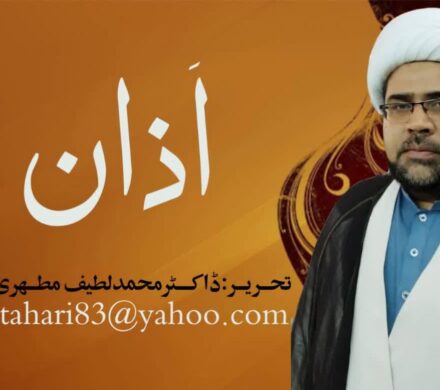
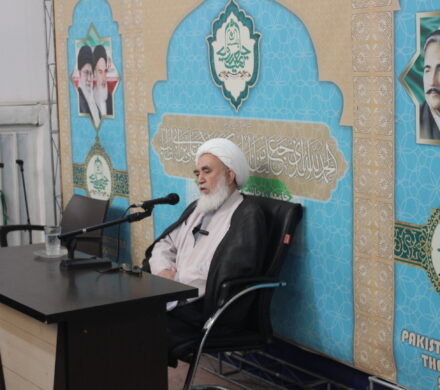
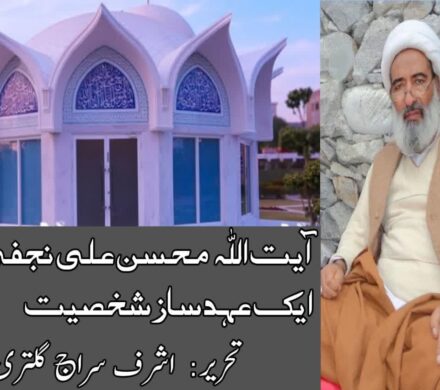
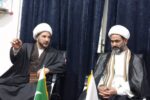


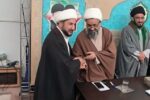



دیدگاهتان را بنویسید